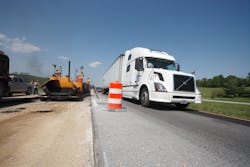DTF: Diesel will keep driving freight transportation
That diesel power will continue to drive the “expansion of freight transportation and the continued growth of the U.S. economy” is the strong contention of Allen Schaeffer, executive director of the Diesel Technology Forum advocacy group.
Schaeffer made this point—and thoroughly backed it up—in a letter to Rep. John J. Duncan, Jr. (R-TN) and members of the Panel on 21st Century Freight Transportation he chairs under the auspices of the House Committee on Transportation and Infrastructure that was sent ahead of a “roundtable” the panel held this week in Washington, DC.
According to Duncan, the ““Effectively Coordinating Freight Planning Activities” roundtable with federal and state officials was held to examine challenges to the coordinated planning of freight-transportation improvements.
The panel’s charge is to “focus on how freight planning stakeholders can effectively coordinate efforts to ensure the timely and well-planned delivery of freight transportation facilities, whether additional ways for these entities to cooperate on the planning of large freight projects can be identified, and identifying challenges that may impede the effective coordination of the planning for large freight projects.”
“The National Petroleum Council, International Energy Agency and ExxonMobil have all concluded that diesel will remain the predominant powertrain in heavy duty applications and the predominant global transportation powertrain in the future,” Schaeffer pointed out for starters.
“Much attention has been granted to emerging fuels, such as natural gas,” he continued. “However, these groups all conclude that natural gas will not be able to compete with diesel given the inherent efficiency of the diesel engine and the energy density of diesel fuel. Natural gas and other emerging fuels may find a place as a niche fuel in certain heavy-duty applications such as refuse hauling.”
Noting that the panel will “play a key role in addressing efforts to coordinate the efficient delivery of freight, the future growth and cooperation of largest scale freight projects, and identifying potential challenges to large freight projects,” Schaeffer said diesel technology and power will be critical to the success of this agenda in a manner that will reduce emissions, improve air quality, and conserve fuel.
“An efficient goods movement industry and infrastructure is vital to economic prosperity,” he continued. “Much of the freight traffic moves by way of trucks, trains, ships and barges, which are powered almost exclusively by diesel.”
Schaeffer noted as well that public-works projects needed to ensure that “cargo moves efficiently through the freight network of roads, highways, bridges, tunnels, railroads, airports, seaports and inland waterways are constructed using equipment that is overwhelmingly powered by diesel engines and fuel.”
Key issues Schaeffer outlined for the panel include:
New Diesel Trucks Have Near Zero Emissions: Because of the introduction and widespread availability of ultra-low sulfur diesel fuel (ULSD) in 2006-2007, new engine and aftertreatment technologies were able to come online to significantly reduce many criteria pollutants including particulate matter (PM), or soot, and oxides of nitrogen (NOX), a smog forming pollutant. These technologies allowed on-road heavy duty trucks to meet the first-ever “near zero” U.S. Environmental Protection Agency emissions regulations beginning with engine model year 2007. These standards were further tightened for the 2010 model year. A truck manufactured after 2007 emits 98 percent less particulate matter and NOX relative to a truck manufactured in 1988.
New Diesel Trucks Have Greater Fuel Efficiency: According to research conducted by Martec Research, new technology diesel engines also contribute to greater fuel efficiency. The owner of a new technology diesel Class 8 heavy duty truck will save $3,500 in fuel costs each year while conserving 21 barrels of crude oil, 875 gallons of fuel and eliminating 8.9 tons of CO2. All Class 4-8 trucks on the road today deployed with new clean diesel engines save 13.3 million barrels of crude oil, 560 million gallons of fuel and eliminate 5.7 million tons of CO2.
New Off-Road Diesel Equipment Is Also Advancing: Off-road equipment including construction,road building, locomotive, marine, agricultural and emergency back-up generators are also deployed with modern emission control technologies that significantly reduce criteria pollutants. The first phase began in January 2011 and virtually eliminated particulate matter emissions. The final phase, beginning in 2014 will similarly bring NOx emissions to near zero levels for the largest machines and equipment. In each case, EPA has provided for the standards to be phased in over time based on engine size. Most pieces of construction equipment including bulldozers, backhoes and motor graders, are compliant with Tier 4 standards. Final Tier 4 rules will apply to larger off-road diesel applications including marine and locomotives beginning in just six months -- January 2014.
U.S. Truck Fleet Is American-Made and A Key Trade Export: The new diesel emission reduction accomplishments and new engine and hybrid technologies are a showcase of U.S. engineering and manufacturing expertise. Over 90 percent of the heavy duty truck fleet is manufactured in the U.S. One in every four engines manufactured in the U.S. is destined for overseas markets. Over $46 billion of diesel technology (engines, vehicles, equipment, parts and fuel) was exported representing 4.4 percent of total U.S. exports. The manufacturing of diesel technology helped sustain 1.25 million jobs and generated $186 billion in national income in 2009, the last year for which statistics are available.
“Clearly, the U.S. economy depends on diesel,” Schaeffer concluded. “With continuing investments in clean diesel technology, these vehicles and equipment will get even cleaner.”
